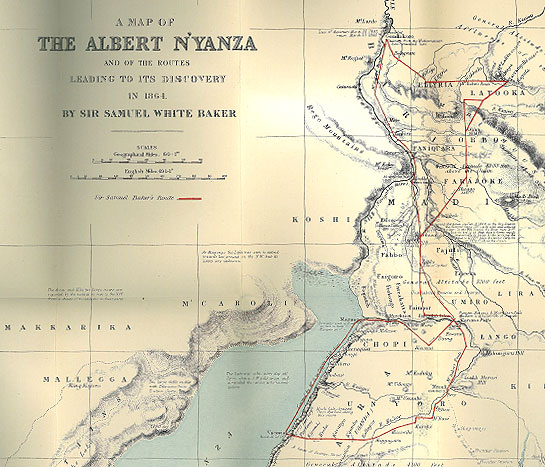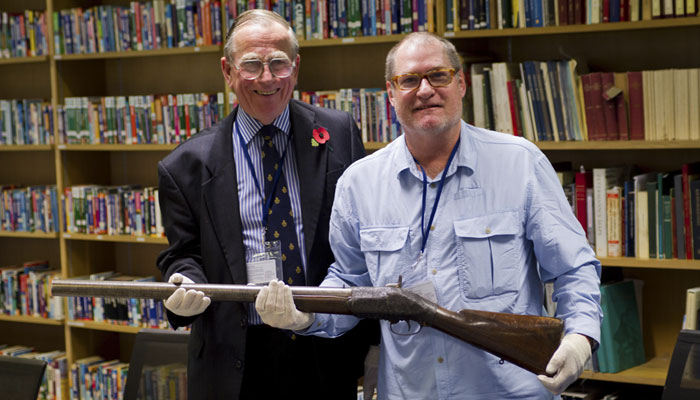| |
|
| |
|
|
| |
 |
| |
| |
 |
| |
click for larger
view |
| |
|
Sir Samuel
White Baker
Sir Samuel White Baker, KCB, FRS, FRGS (8 June 1821 –
30 December 1893) was a British explorer, officer, naturalist,
big game hunter, engineer, writer and abolitionist. He also
held the titles of Pasha and Major-General in the Ottoman
Empire and Egypt. He served as the Governor-General of the
Equatorial Nile Basin (today's South Sudan and Northern
Uganda) between Apr. 1869 - Aug. 1873, which he established
as the Province of Equatoria. He is mostly remembered as
the discoverer of Lake Albert, as an explorer of the Nile
and interior of central Africa, and for his exploits as
a big game hunter in Asia, Africa, Europe and North America.
Baker wrote a considerable number of books and published
articles. He was a friend of King Edward VII, who as Prince
of Wales, visited Baker with Queen Alexandra in Egypt. Other
friendships were with explorers Henry Morton Stanley, Roderick
Murchison, John H. Speke and James A. Grant, with the ruler
of Egypt Pasha Ismail The Magnificent, Major-General Charles
George Gordon and Maharaja Duleep Singh.
In March 1861 he started upon his first tour of exploration
in central Africa. This, in his own words, was undertaken
"to discover the sources of the river Nile, with the
hope of meeting the East African expedition under Captains
Speke and Grant somewhere about the Lake Victoria."
After a year spent on the Sudan–Ethiopian frontier,
during which time he learned Arabic, explored the Atbara
river and other Nile tributaries, and proved that the Nile
sediment came from Ethiopia, he arrived at Khartoum, leaving
that city in December 1862 to follow up the course of the
White Nile.
Two months later at Gondokoro he met Speke and Grant, who,
after discovering the source of the Nile, were following
the river to Egypt. Their success made him fear that there
was nothing left for his own expedition to accomplish; but
the two explorers gave him information which enabled him,
after separating from them, to achieve the discovery of
Albert Nyanza (Lake Albert), of whose existence credible
assurance had already been given to Speke and Grant. Baker
first sighted the lake on March 14, 1864. After some time
spent in the exploration of the neighbourhood, Baker demonstrated
that the Nile flowed through the Albert Nyanza. He formed
an exaggerated idea of the relative importance of the Albert
and Victoria lake sources in contributing to the Nile flow
rate. Although he believed them to be near equal, Albert
Nyanza sources add only ~15% to the Nile flow at this point,
the remainder provided primarily by outflow from Lake Victoria.
He started upon his return journey, and reached Khartoum,
after many checks, in May 1865.
|
| |
 |
|
Sir
Samuel White Baker |
|
| |
|
In the following October Baker returned to England with his
wife, who had accompanied him throughout the dangerous and
difficult journeys in Africa. In recognition of the achievements,
the Royal Geographical Society awarded him its gold medal,
and a similar distinction was bestowed on him by the Paris
Geographical Society. In August 1866 he was knighted. In the
same year he published The Albert N'yanza, Great Basin of
the Nile, and Explorations of the Nile Sources, and in 1867
The Nile Tributaries of Abyssinia, both books quickly turned
into several editions. In 1868 he published a popular story
called Cast up by the Sea. In 1869 he travelled with the future
King Edward VII (who was the Prince of Wales at that time)
through Egypt.
Baker never received quite the same level of acclamation
granted to other contemporary British explorers of Africa.
Queen Victoria, in particular, avoided meeting Baker because
of the irregular way in which he acquired Florence, not
to mention the fact that during the years of their mutual
travels, the couple were not actually married. A court case
involving his brother Valentine Baker (following his indecent
assault of a woman on a train) also harmed Baker's chances
of wider acceptance by the Victorian establishment.
In 1869, at the request of the khedive Ismail, Baker led
a military expedition to the equatorial regions of the Nile,
with the object of suppressing the slave-trade there and
opening the way to commerce and civilization. Before starting
from Cairo with a force of 1700 Egyptian troops - many of
them discharged convicts - he was given the rank of pasha
and major-general in the Ottoman army. Lady Baker, as before,
accompanied him. The khedive appointed him Governor-General
of the new territory of Equatoria for four years at a salary
of £10,000 a year; and it was not until the expiration
of that time that Baker returned to Cairo, leaving his work
to be carried on by the new governor, Colonel Charles George
Gordon.
He had to contend with innumerable difficulties - the blocking
of the river in the Sudd, the hostility of officials interested
in the slave-trade, the armed opposition of the natives
- but he succeeded in planting in the new territory the
foundations upon which others could build up an administration.
|
| |
 |
David Baker, the great-great-grandson of Sir Samuel
White Baker with Julian Monroe Fisher
in the Foley Reading Room at the Royal Geographical
Society in London, November 2012.
David and Julian are holding Sir Samuel Baker's
original expedition rifle, "the baby".
David Baker and his daughter
Melanie
joined Julian
during Phase Two of The RailRiders Great African
Expedition.
|
|
|
|
| |
|
|
| |
|
|
|



